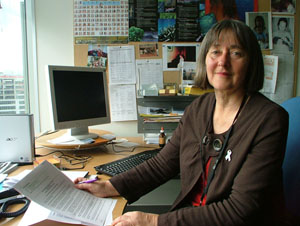
MELBOURNE (Radio Australia Pacific Beat / Pacific Media Watch): A New Zealand opposition MP wants Kiwi police to leave the Indonesian province of Papua.
They are there to train their local counterparts in the principles of community policing.
The call comes in the wake of the recent shooting deaths of pro-independence activists at the Papuan People's Congress in Jayapura, and unrest around an ongoing strike at the Freeport copper mine in Timika.
Presenter: Bruce Hill
Speaker: Catherine Delahunty, New Zealand Greens MP
[Listen]
DELAHUNTY: I am going to talk to the Minister of Foreign Affairs and ask him to review the whole scheme, because the idea was that we use a perfectly sound principle of policing in community policing and it was going to help with human rights. You certainly cannot say that Papuan people have had more human rights in the way that the police and military have been treating them and in fact the police are implicated in some of the violence that took place against West Papuans who had gathered to discuss their self-determination.
We are validating an invalid situation, we are giving credence and credibility to a police force that are actively attacking their own citizens. We know that torture and abuses by both the police and military are now commonplace and have been for sometime and we cannot say that New Zealand's involvement is reducing the impact of those injustices.There is no evidence to suggest we're making anything better, so we should be brave enough to say so.
HILL: When this community policing initiative was announced, the argument was made that sure there are some problems with police work in Papua, but that if countries like Australia and New Zealand don't actually get in there and work with the security forces, then things won't ever get better?
DELAHUNTY: I think that's a very flawed argument and avoids the real issue, which is Australia and New Zealand can make things better when their governments challenge Indonesia to work towards peace, through a peace dialogue. Small community and policing initiatives on the ground help to whitewash the fact that the Indonesians are operating a regime in West Papua which is unjust, illegal and unsustainable and that we are allowing them to continue in our name.
Australia and New Zealand governments must step up now. We've seen what's happened to the Congress in Jayapura last week that the police were involved in killing and we just cannot sit by and do nothing about that and pretend that we're helping by sending a training program over for a police force that's implicated in suppressing the rights of the communities of West Papua.
HILL: Well, how likely is it that the Minister of Foreign Affairs is going to pay attention to you? I mean after all, you're a member of parliament from the Greens Party, which is a very small party in New Zealand. Are they going to pay attention to what you're saying?
DELAHUNTY: Green Party is a small party, we're about to hopefully get bigger this election, we are also the conscience of the government on these issues. We will continue to be that conscience and we need to point out to a national government that there are precedents. In the past, even national governments have done things for Bougainville, they have assisted in the peace process. The New Zealand government could play a very positive role and a real leadership role, so much as we're not romantic about what the New Zealand government's view of challenging Indonesia is. We know that they have prioritised trade over human rights and justice. We are going to call on them to take leadership so that we can hold our heads up in this region and be a country that has in the past shown real leadership to create peace dialogue. That's what the people of West Papua want, they want a peace dialogue, they want international support from Australia and New Zealand and it's not much to ask to call on human rights, an end to torture and for discussions between Indonesia and West Papuan leaders.
HILL: But, if countries like New Zealand did what you're asking them and pulled out of these joint operations and community policing initiatives, might that cause Jakarta to just dig its heels in even further and refuse to listen to any appeals?
DELAHUNTY: They're not listening now, how much further can they dig when they've already killed people in cold blood for simply discussing their human rights and self-determination when you can get 20 years in jail for raising the West Papuan Morning Star flag. There is absolute history that says that as countries stand up to regimes that are oppressive, such as apartheid in South Africa, being one glaring example. There has to be consequences for the unjust behaviour and right now, community policing is not challenging the Indonesian government to look at their own behaviour. So we've got nothing to lose in taking a much stronger and more ethical stance.
(cc) Creative Commons



